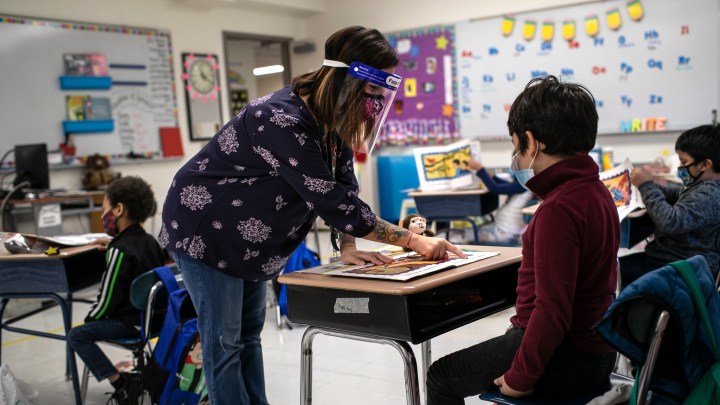
Teachers move near the front of the line for vaccine
Teachers move near the front of the line for vaccine

Health care workers and residents of nursing homes around the country have started to receive the very first doses of COVID-19 vaccines.
This week an advisory panel at the Centers for Disease Control and Prevention made recommendations about which frontline essential workers — those in jobs that put them at the highest risk — should be next.
On the short list: people who staff food and agriculture supply chains, firefighters, those in law enforcement and teachers.
There have been questions about where educators should be on the list as they technically can work remotely, though distance learning has created other problems.
States will have the final say about when teachers get vaccinated. Utah for example, is already planning to vaccinate all educators in January.
But teachers may not be considered essential frontline workers under some state guidelines, said labor economist Francine Blau at Cornell University.
“These categories are nuanced,” she said. “So we have to consider — is remote education a possibility? What are the downsides to remote education for the students themselves but also for their families?”
Blau co-authored a National Bureau of Economic Research paper about which workers should be considered frontline. She said teachers may not be as at risk as, say, meatpacking staff. They can work at home, as many have been for months.
But shutting down in-person learning has brought other complications, said health policy professor Lisa Prosser at the University of Michigan.
“We are especially concerned about disruptions in in-person schooling that there may be very long-term effects, especially in these vulnerable communities,” she said.
Remote school has amplified existing economic disparities, said Prosser, and made it hard for many parents, especially women, to work.
But simply vaccinating teachers may not automatically make schools safe, said Harley Litzelman, a high school teacher in Oakland, California.
“If there’s uncontrolled spread in a community, there’s going to be something similar in schools,” he said.
While kids are at lower risk of severe disease, they have been found to spread the virus. Current vaccines have only been authorized for adults. Clinical trials to prove efficacy in children began in October, meaning it will likely be well into next year before many students can be immunized.
There’s a lot happening in the world. Through it all, Marketplace is here for you.
You rely on Marketplace to break down the world’s events and tell you how it affects you in a fact-based, approachable way. We rely on your financial support to keep making that possible.
Your donation today powers the independent journalism that you rely on. For just $5/month, you can help sustain Marketplace so we can keep reporting on the things that matter to you.


















